MSP Growth | Value Creation | M&A
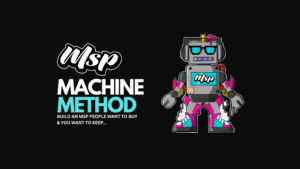
Build an MSP that people want to buy, and you want to keep; implement the ‘MSP Machine’ method.
Starting, building, growing and eventually selling an MSP business is tough. The MSP Machine method is a foundation and framework to guide MSP & IT business owners through the core areas of focus to add value to their business. Once each segment of the machine is implemented and developed, it will act as a flywheel
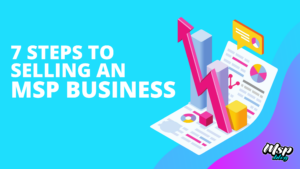
How to sell an MSP business and the steps involved
This guide will give you 7 high-overview steps of the core phases carried out during an MSP business exit and acquisition. Every business exit and sale are unique and follow their own path when it comes to the detail, but this guide can be used as a general outline to understand the core stages during

How to find the perfect buyer for your MSP business
MSP owners often find selling their businesses more challenging than running them. It’s not because selling is particularly hard, but because exits are often an afterthought and founders don’t spend enough time learning about the processes, jargon and options. Finding a perfect buyer is key to maximise your return and ensure a great future for

What is an ‘Earn Out’ (EO) and what to watch out for?
An earn-out (EO) is a common mechanism during the sale of an MSP business. It is to protect the buyer during the acquisition and to keep the current sellers motivated throughout the process. When selling an MSP, a figure or valuation calculation is agreed, and this ultimately is the ‘sale price’ for the MSP –

Add value to your MSP through your Tech-Stack
When assessing your business, a key area that forms the foundation of a solid MSP is it’s ‘Tech Stack’. With so much technology out there and a huge array of vendors it can be common for MSP’s to have messy, overcomplicated tech stacks that is made up of technology that does not function succinctly together.

Top Buzzwords & phrases you need to know within M&A
You don’t need to be a financial expert or FD to take your MSP through the M&A process (we recommend you work with a good one though!) but the M&A space is known for having more 3 letter acronyms than us IT guys. The below are some of the most common phrases and words used

Why your MSP business (or any business) NEEDS a ‘value ladder’!
Are you struggling to convert a big percentage of your leads? Are you getting feedback that you are ‘too expensive’? Are you losing business to your competition? When many business owners create and launch their business they have a flagship service, product or offering that they want to sell. This is fine and all businesses

Take your MSP to the next level. Find your niche…
If you want to stay relevant, add value and stay ahead you need to own your space. Don’t be vanilla… A lot of managed service providers and IT suppliers look the same, they look ‘vanilla’. 10 years ago, this was fine as you were still in high demand for your IT skills and knowledge. Now

Avoid These Six Common Mistakes When Selling Your MSP Business
Our friends at Quiet Light provide x6 common mistakes when selling an MSP, and how you can avoid them. Selling your MSP business can be a daunting task, even for seasoned business owners. Whether you’re looking to retire or are ready to explore new business opportunities, exiting your business involves careful planning and preparation. However, even

5 Tips and Tricks to start & launch an MSP IT Business [Exclusive e-book inside]
The MSP.blog team have teamed up with the guys from SuperOps.ai to bring you an action packed e-book on how to start an IT MSP business. Starting an MSP business is an exciting journey filled with opportunities to deliver exceptional IT services and make a lasting impact. According to a comprehensive research report by Grand

Finding Your ‘Flow’ as an MSP Leader: Why it Matters, and How to Do It – Vendor Guest Blog: Syncro
Today we have Jennifer Tribe from Syncro talking about finding your flow as an MSP leader… Jennifer Tribe is host of the Workflow for MSPs podcast. She serves as Director of Content at Syncro, an all-in all-in-one RMM, PSA, and remote access tool that helps managed service providers run more profitable businesses. Great athletes often

How can MSP’s leverage AI to grow their business?
As technology continues to evolve, Managed Service Providers (MSPs) have the opportunity to make money from Artificial Intelligence (AI). AI is transforming many aspects of our lives and businesses, and MSPs can capitalize on this trend to increase their revenue. By leveraging AI-powered technologies such as machine learning, natural language processing, computer vision, and more,
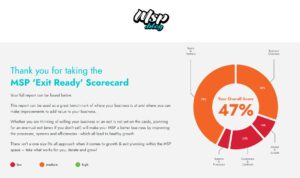
Are you building an MSP of value?
That can be sold now, or in the future… According to Forbes, 8 out of 10 businesses will not sell. More often than not, this is because they never developed an exit strategy. The MSP.blog team has developed a free assessment scorecard that allows you to review where you are at in terms of adding
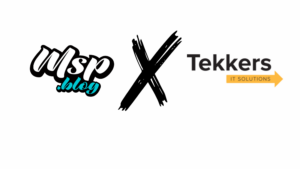
MSP Exit Interview – Pete Matheson (Tekkers IT)
What was your MSP and when did you start it? Tekkers IT Solutions, in 2011. Started as I was working too much and getting paid too little. I felt the local SMBs were being underserved. £1.2m Revenue. 16 Staff. Covering Hampshire & West Sussex. Core services – MSP / IT Support + BCDR /

MSP Exit Interview – Daniel Welling (amicitia)
What was your MSP Business and when did you start it? I co-founded amicitia in 2002, with a former customer who had become a friend and neighbour; he was tech and I was sales. Previously I had worked in IT solution sales roles and like many MSP-founders felt we could do better running a business!
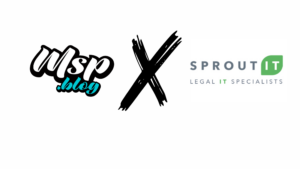
MSP Exit Interview – Matt Torrens (Sprout IT)
What was your MSP Business and when did you start it? I ran SproutIT for a little over a decade before exiting in November 2020. Earlier in my career, I had worked in a vast blue chip (Microsoft’s largest global customer at the time) and hated the fact that I was ‘just a number’. I

MSP Exit Interview – Jim Turner (Hilltop Consultants)
What was your MSP and when did you start it? I started Hilltop Consultants in 2003. I had been working for an IT consulting firm and like many techs, felt that I could do just as good of a job running a business as my boss. I started taking on small clients that were referred
